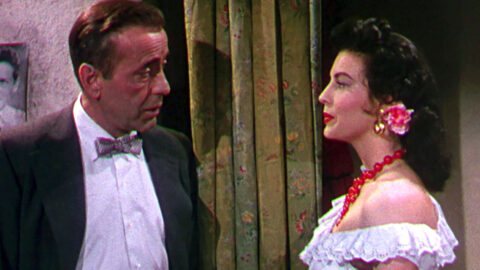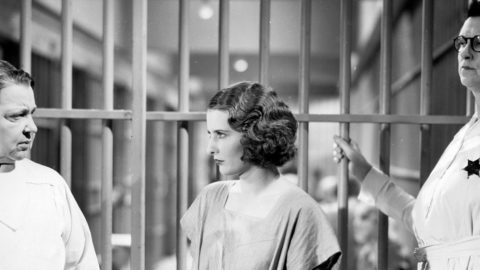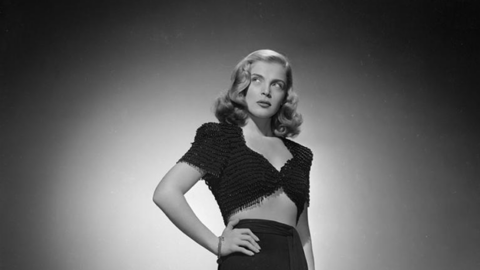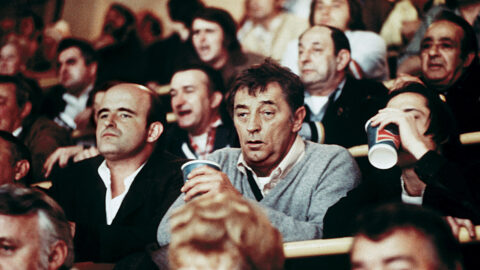TCM Diary: Robert Mitchum x 2
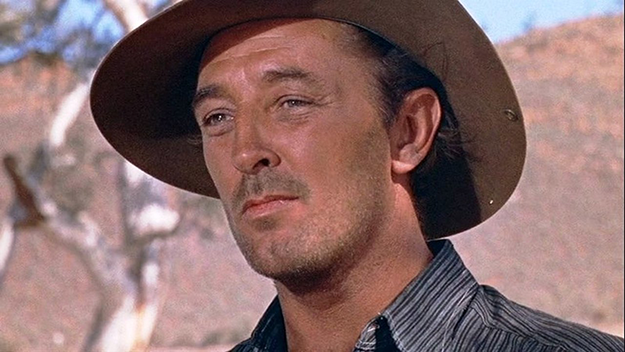
The Sundowners
One of the great shocks of my young life came the day I was rummaging through my grandparents’ vinyl collection and discovered, in back of Robert Goulet’s Greatest Hits and the cringe-worthy Allan Sherman parody records, a Caribbean folk album recorded by Robert Mitchum! Entitled Calypso—is like so…, its cover features the sleepy-eyed noir icon lounging in a tropical bar with a bottle of rum and an admiring brunette—Max Cady in Margaritaville. Seemingly cut and pressed in camp heaven, the album surprised me with mere existence, but the seismic revelation was that—questions of appropriation and Bob’s West Indian dialect aside—it’s actually a wonderful record. The star discovered Calypso while shooting Heaven Knows, Mr. Allison in Trinidad, meeting artists like Mighty Sparrow and studying their phrasing. Anyone who’s seen Thunder Road or The Night of the Hunter can attest to Mitchum’s powerful baritone, but still could hardly anticipate his rigorous commitment to form, down to his mastery of local slang in songs like “Mama, Looka Boo Boo,” about a father who’s put off his food by his sons’ scorn for his homely face. PC it’s not, but it’s a steel-drummed delight, and as ever, Mitchum takes insouciance quite seriously indeed.
That may be the central paradox of Robert Mitchum—with his heavy lids, infamous marijuana bust (costing him 43 days in a prison farm), and Out of the Past catchphrase “Baby, I don’t care,” he’s easily mistaken for a sleepwalking star, coasting on languid charisma. The fact is that few actors challenged themselves as thoroughly or frequently as Mitchum did, or had a greater understanding of their own abilities. When David Lean asked if he could muster an Irish accent for his role as the cuckolded schoolteacher in Ryan’s Daughter, he retorted, “Come on, David! Which county?”
Fans of his trench coat-clad antiheroes and smooth-talking sociopaths may approach his role as the Australian patriarch of The Sundowners with the same trepidation I brought to his calypso album. His Paddy Carmody roams the outback with wife Ida (Deborah Kerr) and teenage son Sean (Michael Anderson, Jr.) in search of work as a sheep drover, and the role is a beguiling change of pace, gifting the grayscale actor with a palette of rich, warm colors. Pitching a tent wherever the sun sets—hence the title—Paddy savors his itinerant life, content only when casting off the ties that make other men feel secure (“All of Australia, that’s what I own—the rivers, the plains, all of it!”). Ida and Sean long for a fixed address, and the clash of their yen for stability with Paddy’s wanderlust imbues the picturesque story with conflict.
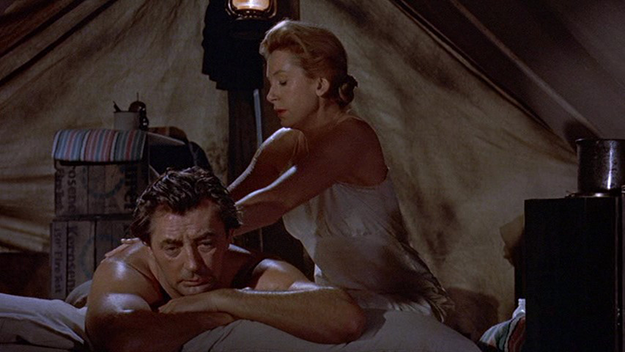
The Sundowners
Paddy’s needs are simple and few: a hat to shade his eyes, a full belly to thump with pride, steady work—be it as a herder, shearer, racer, or breeder—and above all, the wife he adores. With her wind-blown hair and careworn face from worry and laughter, Kerr is earthily radiant. She and the bluff, barrel-chested Mitchum (both sporting flawless accents) have the easy rapport of a long-married couple with no illusions but bone-deep devotion. He celebrates their mortgage-free independence; she chides him that you can’t mortgage a tent. In reality, Kerr was Mitchum’s favorite leading lady; he gladly ceded top billing for the chance to work with her again after Heaven Knows, Mr. Allison, telling the production team, “You can design a 24-foot sign of me bowing to her if you like!” They would collaborate twice more, and their mutual affection is palpable in every scene they share, from the early one where he watches her prepare for bed, his head cocked and eyes half-closed in appreciation.
“You’re built the way a woman ought to be built,” he proclaims, comparing her favorably to all the “broomsticks” and glamour girls about town. Released in 1960, The Sundowners is the rare film with regard for the way hardworking people actually look: Mitchum and Kerr are tanned and weather-beaten, and he often appears in his undershirt, not chiseled or clean but authentically of the land. In the film’s most poignant scene, played out with no dialogue, Ida, dusty from the trail, spies an elegant lady in a pink dress through the window of a train and watches her apply her makeup, dreaming of the life she’s sacrificed to her husband’s nomadic ways. But as she observes the debutante with envy, the camera beholds Kerr the way Mitchum does, as the genuine article, a person of sinew and substance without whose companionship the sun might just as well stay down.
Directed by Fred Zinnemann, The Sundowners has the flavor of John Ford down under, complete with barroom donnybrooks. Indeed, much action occurs in the taverns where Paddy holds court each Saturday night, giving sonorous voice to the ballads of his Irish ancestry like “The Wild Colonial Boy.” As the admiration of his own boy shifts from Paddy to Rupe, the rakish but kindhearted sea captain traveling with them (an impeccable Peter Ustinov), Paddy becomes the Mitchum we know well: moodily perched at the end of the bar, able to command the room with his magnetism but choosing instead to sit in solitude as the others ignore him.
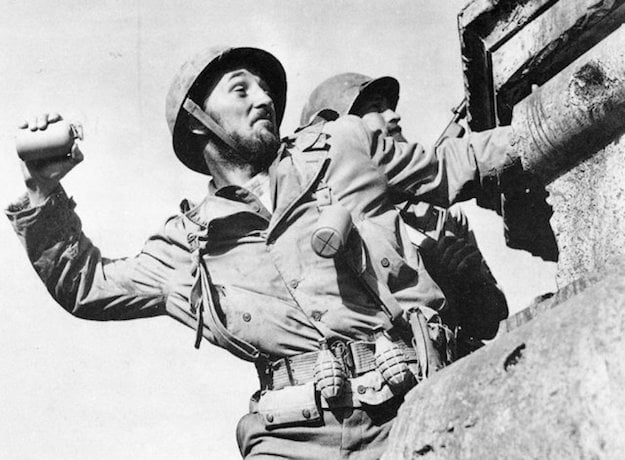
The Story of G.I. Joe
When Sean returns from seeing a play with Rupe, Mitchum yields one of the tenderest line readings of his career: “You went to the show with Rupe ’cause that’s what he likes. Now have a beer with me ’cause that’s what I like.” At once commanding and pathetic, his appeal combines forlorn awareness that his impressionable son favors the more worldly Rupe, pride at the rite of passage he’s about to facilitate, and fear that the important people in his life are pulling in opposite directions, leaving him alone on a bar stool. A towering man, Mitchum could make himself appear small and crestfallen. He could also play high comedy, as in a sequence where he loses a sheep-shearing contest to a toothless old man who never breaks a sweat. Fortunes won and lost in a second, without preamble or prejudice, is the life of a sundowner, and only an actor of Mitchum’s emotional range could manage the turns in the road.
It might further surprise one to learn that Mitchum’s fatherly forbearance was evident from his first significant role. By 1945 he’d appeared in two dozen films in two years, often uncredited (or billed as “Bob Mitchum”) and usually cast in a bit part as a serviceman. Director William Wellman, who earned the nickname “Wild Bill” as a fighter pilot in the First World War, plucked him from near-obscurity to play Lt. Bill Walker, the CO of an infantry division embroiled in World War II’s Italian campaign, in The Story of G.I. Joe. Alongside Mitchum, Burgess Meredith is beautifully restrained as Ernie Pyle, the famed war correspondent who accompanied many such units and reported what he saw.
In their first encounter, Mitchum’s Walker tells Pyle that his father enjoys his column, establishing the battle-hardened soldier as a generation younger than the journalist. Though leaner and less cultivated than in later roles, Mitchum looks considerably more than his 28 years. Separated from his wife, Walker has given his all to the army and in return it has prematurely aged him. By the time he’s promoted to Captain—after what Pyle terms the company’s “baptism by fire”—the light has gone from his eyes, stoic competence for his men’s sake replacing all vestiges of the droll, charming man he must’ve been before the war.
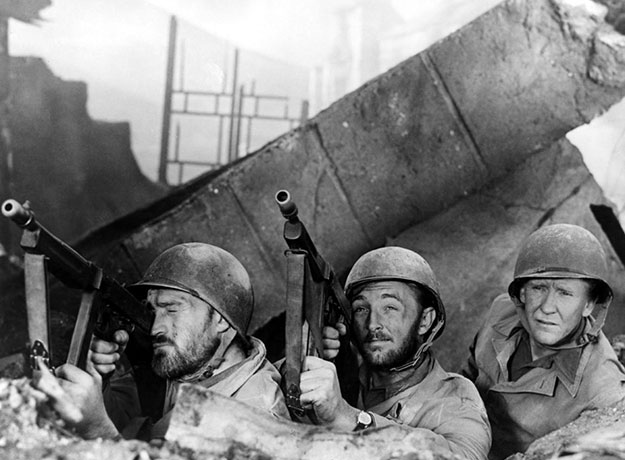
The Story of G.I. Joe
Walker has little dialogue compared with the loquacious recruits and the eloquent voiceover drawn directly from Pyle’s dispatches, but Mitchum’s deep, authoritative tones find the poetry in phrases as banal as “OK, sergeant, go get some chow.” His most memorable scene finds him sharing a bottle of grappa with Pyle late one night, reflecting drunkenly on the letters he drafts to the mothers of dead soldiers (“See, I’m a writer too…”), considering that waging war is a never-ending regimen of taking hills, and wondering what good might come out of redirecting the energy spent on claiming worthless mounds of dirt. A throwaway reference to an old W.C. Fields joke illustrates Walker’s dormant sense of humor and overtaxed sense of the absurd. It’s a mid-size supporting role—one that brought him the sole Oscar nomination of his career—but he makes it unforgettable, conveying Walker’s professionalism, sentimentality, regular-guy hopes and dreams, and career-soldier disillusionment.
Dwight Eisenhower called The Story of G.I. Joe the finest war film he’d ever seen, and one could scarcely argue with him: it eschews stock characters and cornball Reader’s Digest-esque “Humor in Uniform,” and, as Pyle did in his column, it humanizes the troops without varnish or cliché. Of Walker’s real-life inspiration, Capt. Henry T. Waskow, Pyle wrote: “In this war I have known a lot of officers who were loved and respected by the soldiers under them. But never have I crossed the trail of any man as beloved as he.” Few deserve such a benediction, but two others plainly do: Capt. Bill Walker, and the man who brought him to life on the screen.
Steven Mears received his MA in film from Columbia University, where he wrote a thesis on depictions of old age in American cinema.



